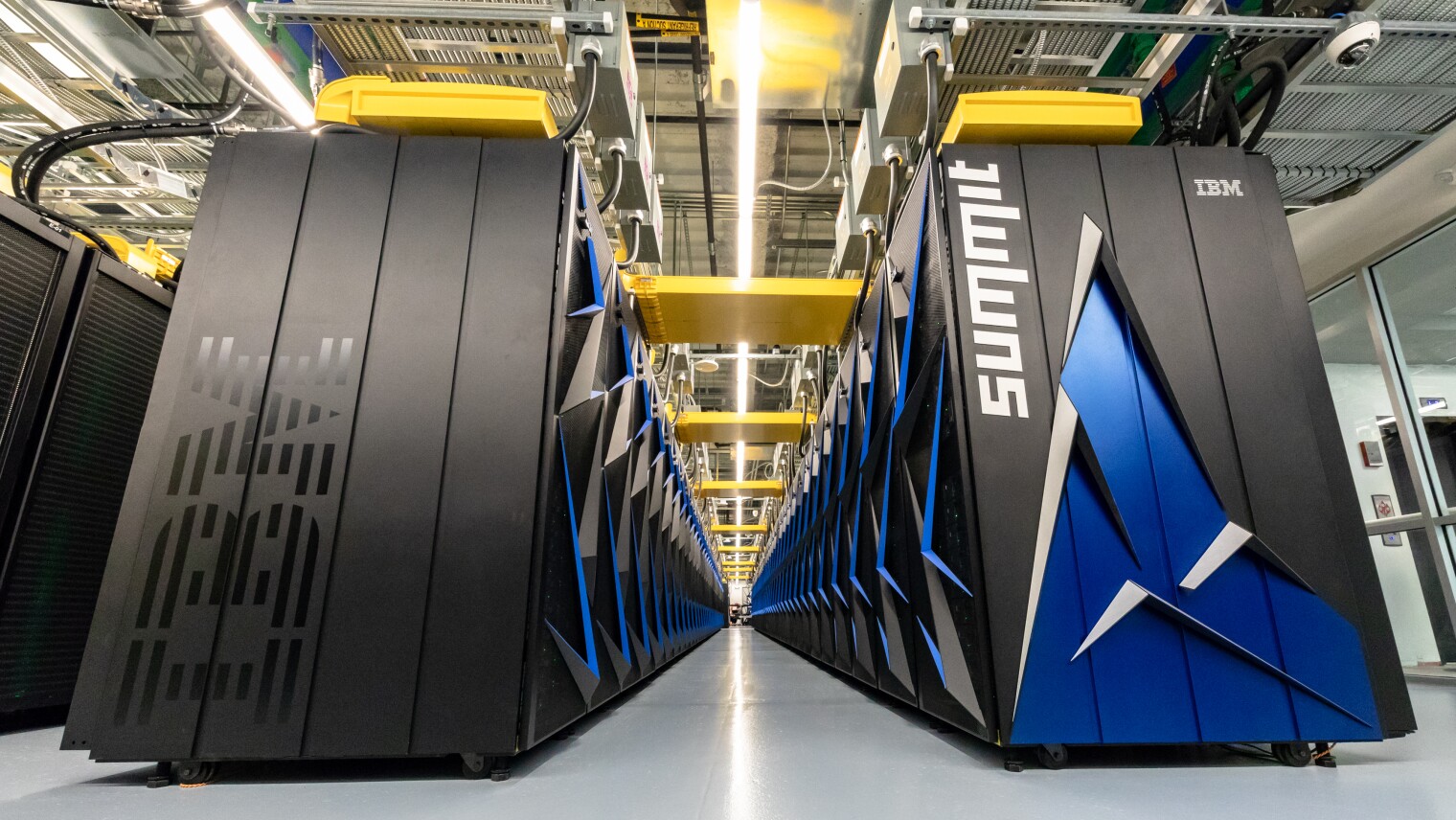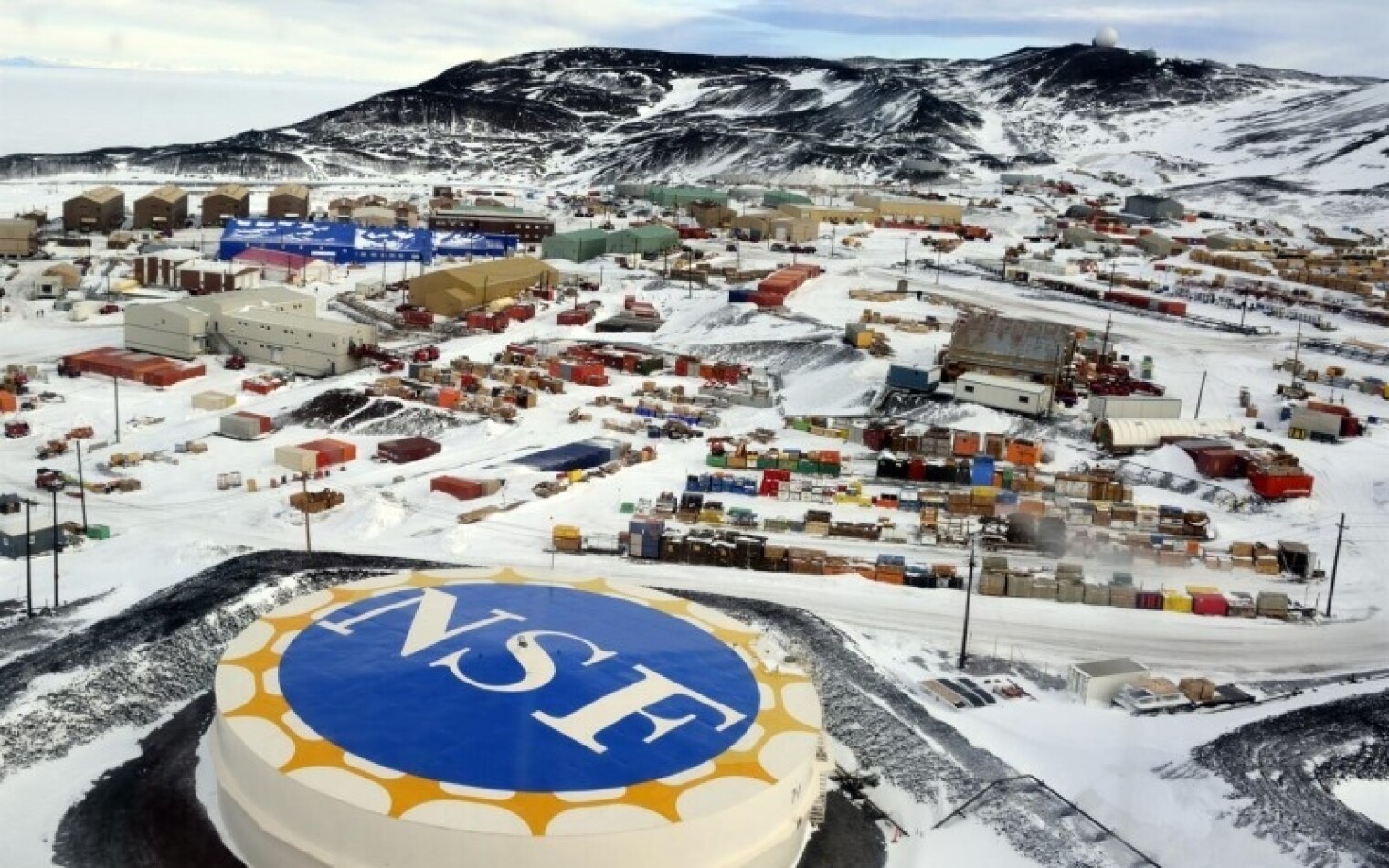| |
| FYI: Science Policy News from AIP |
| THIS WEEK |
|
|
|
|
|
|
| What’s Ahead |
 |
| The Summit supercomputer at Oak Ridge National Lab. (Carlos Jones / ORNL) |
DOE Supercomputing Facility Priorities Up for Discussion
Advisors to supercomputing programs at the Department of Energy will meet Wednesday to consider approving a draft report recommending priorities for future facilities, the latest in a series of such reports produced by advisory committees for DOE’s Office of Science. The office charged the Advanced Scientific Computing Advisory Committee with assessing prospective upgrades to supercomputers and data transmission networks, and ASCAC’s draft report categorizes all of them as “absolutely central” to enabling world-class science, the highest level of importance in the rubric provided by DOE. The report also states that these facilities should be viewed as an “ecosystem” that serves as the “de facto high-end national computing infrastructure” for many U.S. research agencies.
The report finds that construction is ready to begin for upgrades to supercomputers at Argonne, Oak Ridge, and Berkeley National Labs as well as the Energy Sciences Network, a data transmission service for the national lab system. Follow-on upgrades to each of these four facilities have “significant science and engineering challenges to resolve before construction,” the report adds, as does the prospective High Performance Data Facility hosted at Jefferson Lab.
Plans for Flagship CHIPS R&D Center Coming into Focus
The operator of the planned National Semiconductor Technology Center will hold a webinar Friday to discuss the roadmap it released last week outlining the next steps for establishing the center, which will spend more than $5 billion on semiconductor R&D and workforce development. The roadmap states that this summer the NSTC will launch a Workforce Center of Excellence and two initial R&D funding opportunities, and it will announce the process for selecting facilities that will be a part of the NSTC. This fall, the NSTC will begin accepting applications for organizations to become members of the center. The roadmap does not set a timeline for selecting a location for the NSTC headquarters. Separately last week, the Semiconductor Industry Association released recommendations on how to structure the NSTC.
Who Does S&T Policy? New Survey Seeks Insights
The magazine Issues in Science and Technology has launched a survey to better understand who counts themselves as part of the community of people who engage in science and technology policy. The magazine notes that in 1968 the journalist Daniel Greenberg estimated the number of people involved in science policy to be somewhere between 200 and 1,000, referring to a passage in his book, The Politics of Pure Science. “By taking this survey, you’re helping the science and tech policy community define itself and its goals,” the magazine states.
Also on Our Radar
- The State Department is seeking space experts from the private sector to advise the U.S. delegation to the upcoming meeting of the UN Committee on the Peaceful Uses of Outer Space. The department notes the event will include a meeting of the “Group of Friends of the Dark and Quiet Sky for Science and Society,” a set of countries that seek to mitigate the effects of satellite constellations on astronomy.
- With the GOES-U weather satellite set to launch on June 25, officials from NASA and the National Oceanic and Atmospheric Administration will hold a briefing Wednesday to preview its capabilities in both terrestrial and space weather monitoring.
|
|
| In Case You Missed It |
 |
| McMurdo station in Antarctica. (NSF) |
US Reaffirms Antarctic Policy
The White House released a new Antarctic policy on May 17 that reaffirms U.S. support for keeping the continent as a zone for research and environmental conservation. The policy largely retains the four major goals outlined in the 1994 document it replaces. The goals set in the new policy are:
- “Protect the relatively unspoiled environment of the Antarctic Region and its associated ecosystems;
- Preserve and pursue unique opportunities for scientific research and understand Antarctica’s relationship to global environmental change;
- Maintain the Antarctic Region as an area of international cooperation reserved exclusively for peaceful purposes; and
- Assure the protection and conservation of the living resources in and ecosystems of the Antarctic Region.”
A spokesperson for the National Science Foundation told FYI that the new policy “does not change” NSF’s role in leading the U.S. presence in Antarctica. The biggest update, they said, is that the policy “acknowledges the impact of climate and other global changes on the Antarctic continent, which raises new scientific questions and elevates the importance of monitoring and understanding the changes in Antarctic glaciers, waters, and ecosystems.” In announcing the update, the White House also stated it would “work with Congress to continue its support of our three world-class, year-round scientific research stations; research in the Antarctic Region on ocean ecosystems and Antarctic marine living resources; and modernization of the nation’s polar icebreaker fleet.”
NIST Director Testifies on Budget Challenges
Budget strains facing the National Institute of Standards and Technology were the focus of a House Science Committee hearing last week. NIST Director Laurie Locascio said that in the wake of the reduced budget it received from Congress for fiscal year 2024 the agency had to freeze hiring, reduce its number of students and postdocs, and pare back some programs. Locascio highlighted how the president’s 2025 budget request for NIST proposes to surge funding for priority areas such as informing standards for artificial intelligence and addressing the agency’s large backlog of facilities maintenance. Aging and decaying research facilities have emerged as major issues across federal research agencies, but the situation at NIST has received particular attention following reports calling out major problems at its labs and offices.
Committee Chair Frank Lucas (R-OK) applauded NIST’s work on AI in his opening statement but expressed concerns that the agency is being overburdened. “While mighty, NIST is a small agency, and its resources are spread exceptionally thin. I am concerned that some of these additional responsibilities may end up taking focus away from core NIST programs,” he said. Committee Ranking Member Zoe Lofgren (D-CA) emphasized the maintenance backlog in her opening statement. “Congress has not funded any real solutions to that problem. Now, the infrastructure issues are coming to a head, decreasing the effectiveness of the agency, damaging staff morale, and in some cases, putting those staff in real danger,” she said.
White House Offers Strategies for STEM Workforce Equity
The White House published a trio of reports this month that explore diversity, equity, and inclusion strategies for the STEM workforce. The first report makes suggestions for agencies to better support STEM researchers with caregiving responsibilities, such as by providing additional gap funding and grant flexibilities to caregivers and by rewarding institutions that support these researchers well. The second includes strategies for reducing organizational, cultural, and institutional barriers in STEM research. It offers advice for institutions and federal agencies on how to conduct workplace climate surveys and design comprehensive DEI training programs for leaders and staff. The third discusses barriers and strategies to build research capacity at Historically Black Colleges and Universities. Among its recommendations are that federal agencies increase training opportunities to help staff and researchers at HBCUs better navigate the federal grant process.
|
|
| Upcoming Events |
All events are Eastern Time, unless otherwise noted. Listings do not imply endorsement. Events beyond this week are listed on our website.
Monday, May 27
Memorial Day.
Tuesday, May 28
Wednesday, May 29
Thursday, May 30
Friday, May 31
Sunday, June 2
Monday, June 3
Know of an upcoming science policy event either inside or outside the Beltway? Email us at fyi@aip.org.
|
|
| Opportunities |
|
Deadlines indicated in parentheses. Newly added opportunities are marked with a diamond.
Job Openings
Solicitations
Know of an opportunity for scientists to engage in science policy? Email us at fyi@aip.org.
|
|
| Around the Web |
|
News and views currently in circulation. Links do not imply endorsement.
White House
Congress
Science, Society, and the Economy
Education and Workforce
Research Management
Labs and Facilities
Computing and Communications
Space
Weather, Climate, and Environment
Energy
Defense
Biomedical
International Affairs
|
|
|
| |
| This message is sent to you because your email address is on our subscribers list. To manage your FYI preferences and subscriptions, please click here . Or you can unsubscribe from all emails from AIP. AIP, 1 Physics Ellipse, MD 20740-3841
301.209.3100 - newsletters@aipcomm.org As a 501(c)(3) non-profit, AIP is a federation that advances the success of our Member Societies and an institute that engages in research and analysis to empower positive change in the physical sciences. The mission of AIP (American Institute of Physics) is to advance, promote, and serve the physical sciences for the benefit of humanity. |
|
| © 2024. American Institute of Physics |
|
|